The Taipei meeting of the Asian Human Rights Court Simulation (AHRCS) wrapped up over the weekend, with legal experts from Taiwan and abroad presenting workshops and discussions on civil liberties, and holding a trial hearing on the case of Taiwanese death row inmate Chiou Ho-shun (邱和順).
“The convening of the AHRCS served the purpose of acting as a real court, to examine cases in Asia and make decisions based on the precedent of international decisions and treaties pertaining to the protection of human rights,” AHRCS deputy secretary-general Karen Cheng (鄭凱榕) said.
“Details from cases involving the death penalty, torture or corruption were discussed at workshops and presentations given by experts,” Cheng said. “The trial hearing on Chiou’s case was also held. A written judgement on the case will be handed down within three months.”
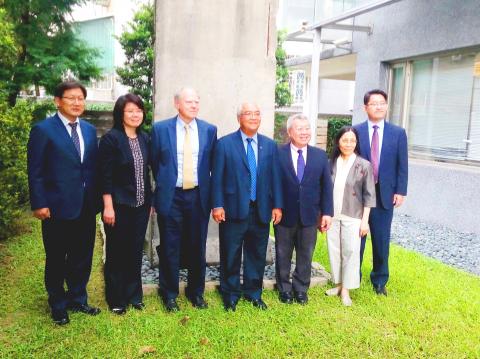
Photo: Jason Pan, Taipei Times
The idea to create the court simulation was inspired by Taiwan’s experience with establishing a shadow court of the Taiwan Constitutional Court, which addressed issues such as same-sex marriage, the death penalty and transitional justice from 2014 to 2016, she said.
Participating jurists from Southeast Asia included former Malaysian Court of Appeals judge Dato’ Mah Weng-Kwai, National University of Singapore Law School professor Tan Hsien-li and Thai judge Pawat Satayanurug.
Conference participants also discussed setting up an Asian Human Rights Court, a supra-national mechanism composed of judges from participating nations that would try cases.
“It is a path that needs to be taken,” Dato’ Mah said. “The Court could be a standard-setting body for the whole region.”
“Each country has its own political system, but some basic standards on rights are the same,” he said, citing torture as an example.
“Although Malaysia is not a signatory to the UN Convention Against Torture and Other Cruel, Inhuman or Degrading Treatment or Punishment, Malaysian law prohibits torture, in protecting the basic human rights of citizens,” he said.
“In Asia, there are authoritarian regimes where human rights are still abused, but the people there could fight for their rights and strive for democracy through a regional body such as a human rights court. Under such a mechanism, torturing suspects to extract a confession and other forms of cruel and inhumane treatment would be prohibited,” Dato’ Mah said.
Some nations have set up a human rights commission at the national level thanks to years of activism and campaigning by civil groups, he said, adding that the Asian Human Rights Court is the same, as advocates have been pushing for its realization.
Hsu Yu-hsiu (許玉秀), a former Council of Grand Justices member and the main advocate in Taiwan for the plan, said that a regional human rights court would be authorized to deliberate on issues of fact and law, order the release of convicts and fine a government for violating the rights of its citizens.
“The model court could exert real influence on Asian courts, despite lacking the authority to issue legally binding verdicts,” she said.
The AHRCS conference judges presiding over Chiou’s hearing were experts in international human rights law from Taiwan, Malaysia, Singapore, South Korea, Japan, Hong Kong and Bangladesh.
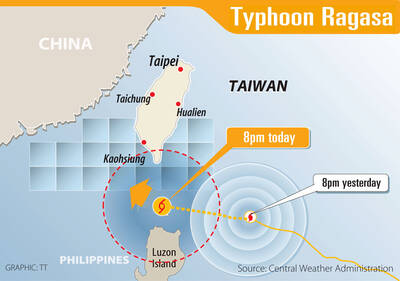
WARNING: People in coastal areas need to beware of heavy swells and strong winds, and those in mountainous areas should brace for heavy rain, the CWA said The Central Weather Administration (CWA) yesterday issued sea and land warnings for Typhoon Ragasa, forecasting that it would continue to intensify and affect the nation the most today and tomorrow. People in Hualien and Taitung counties, and mountainous areas in Yilan and Pingtung counties, should brace for damage caused by extremely heavy rain brought by the typhoon’s outer rim, as it was upgraded to a super typhoon yesterday morning, the CWA said. As of 5:30pm yesterday, the storm’s center was about 630km southeast of Oluanpi (鵝鑾鼻), Taiwan’s southernmost tip, moving northwest at 21kph, and its maximum wind speed had reached
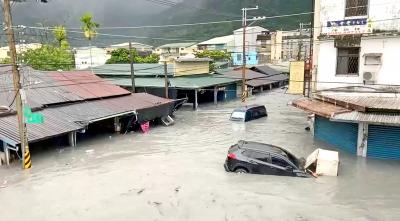
MATAIAN RIVER: Rescue operations were ongoing, with officials urging residents to move to higher floors where possible as teams focus first on those at ground level Floodwaters from the overflowing Mataian River (馬太鞍溪) barrier lake swept into Hualien County’s Guangfu Township (光復) yesterday afternoon, leaving hundreds of people trapped and three missing as of press time last night, the Hualien County Fire Bureau said. The waters surged into downtown Guangfu after the riverbank burst at about 2:50pm, carrying mud and debris and submerging streets to rooftop level in some areas. Residents were seen climbing onto vehicles and rooftops to await rescue as thick, silt-laden water inundated the town. The surge destroyed the Mataian Bridge (馬太鞍溪橋) and flooded the Guangfu Railway Station. Rescue operations were launched with support from fire departments
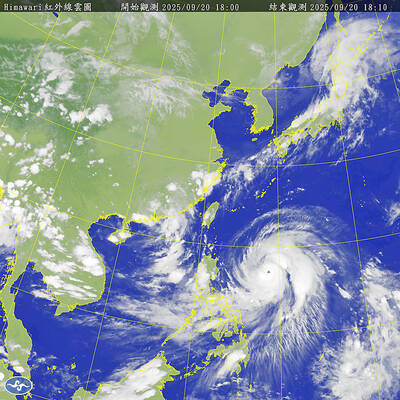
The Central Weather Administration (CWA) yesterday said that it expected to issue a sea warning for Typhoon Ragasa this morning and a land warning at night as it approached Taiwan. Ragasa intensified from a tropical storm into a typhoon at 8am yesterday, the CWA said, adding that at 2pm, it was about 1,110km east-southeast of Oluanpi (鵝鑾鼻), Taiwan’s southernmost tip. The typhoon was moving northwest at 13kph, with sustained winds of up to 119kph and gusts reaching 155kph, the CWA Web site showed. Forecaster Liu Pei-teng (劉沛滕) said that Ragasa was projected to strengthen as it neared the Bashi Channel, with its 200km
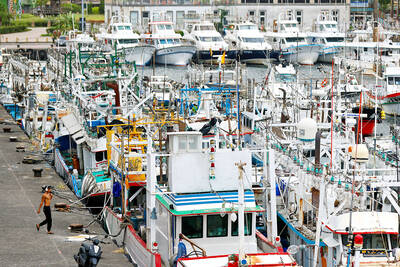
PUBLIC ANNOUNCEMENTS: Hualien and Taitung counties declared today a typhoon day, while schools and offices in parts of Kaohsiung and Pingtung counties are also to close Typhoon Ragasa was forecast to hit its peak strength and come closest to Taiwan from yesterday afternoon through today, the Central Weather Administration (CWA) said. Taiwan proper could be out of the typhoon’s radius by midday and the sea warning might be lifted tonight, it added. CWA senior weather specialist Wu Wan-hua (伍婉華) said that Ragasa’s radius had reached the Hengchun Peninsula by 11am yesterday and was expected to hit Taitung County and Kaohsiung by yesterday evening. Ragasa was forecast to move to Taiwan’s southern offshore areas last night and to its southwestern offshore areas early today, she added. As of 8pm last night,